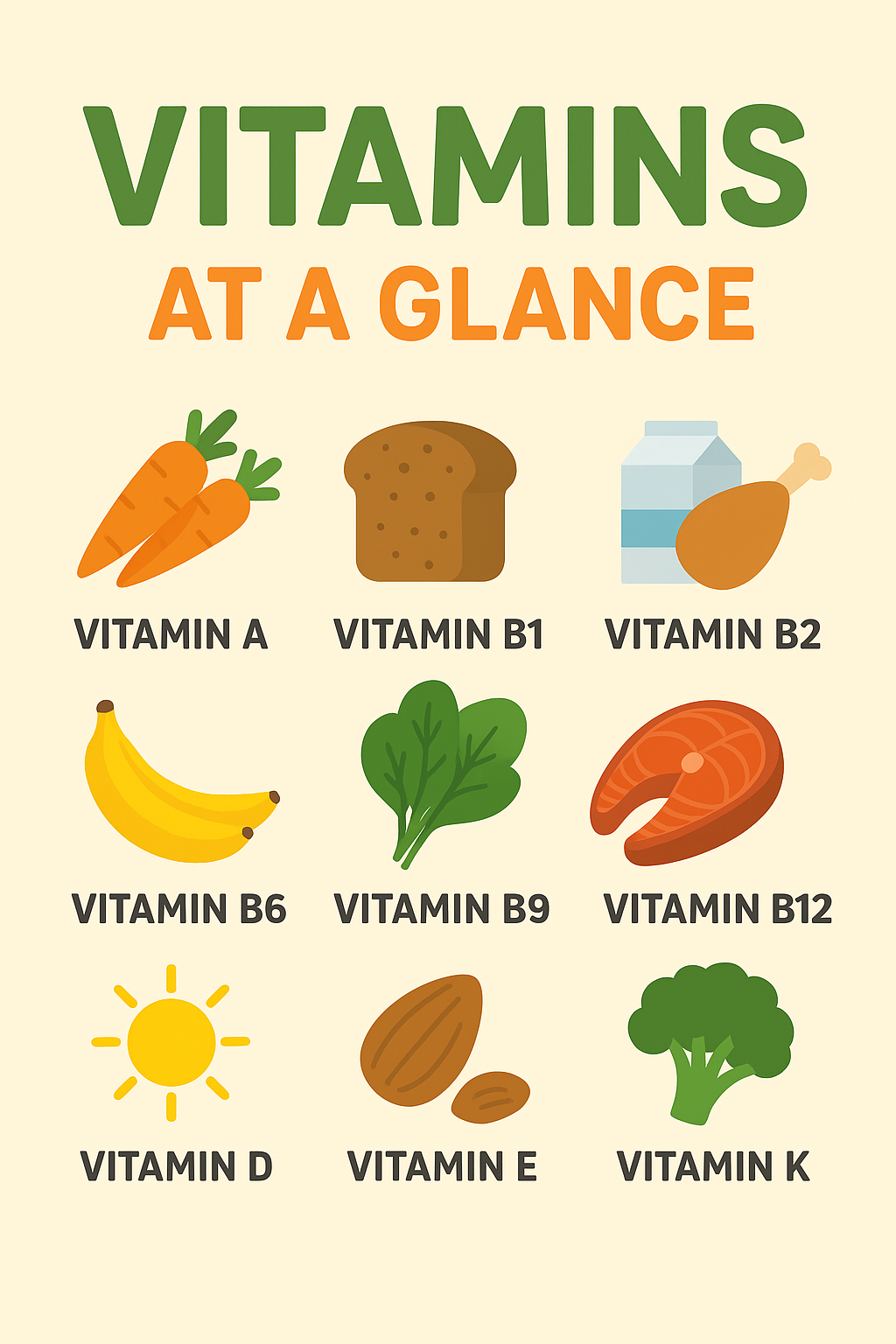In the world of health and wellness, vitamins play the role of invisible superheroes. Though required in small amounts, they are essential for immunity, growth, energy production, mental health, and overall well-being. Unfortunately, vitamin deficiencies are more common than we think and can lead to serious health issues if ignored.
This blog explores each essential vitamin, the deficiency diseases, symptoms, and natural remedies/sources—all in a practical way for modern readers.
What are Vitamins?
Vitamins are organic compounds that our body cannot produce sufficiently on its own. They regulate biochemical reactions, maintain immunity, and help prevent chronic diseases.
They are classified into two groups:
- Fat-soluble vitamins (A, D, E, K): Stored in the liver and fatty tissues.
- Water-soluble vitamins (B-complex & C): Not stored for long; need daily intake.
List of Vitamins, Deficiency Diseases, Symptoms & Sources
1. Vitamin A (Retinol)
- Functions: Healthy vision, immune system, skin health.
- Deficiency Disease: Night blindness, xerophthalmia.
- Symptoms: Poor vision in dim light, dry eyes, skin issues.
- Sources: Carrots, spinach, sweet potatoes, papaya, fish liver oil, dairy.
2. Vitamin B1 (Thiamine)
- Functions: Converts food into energy, supports nerves & muscles.
- Deficiency Disease: Beriberi, Wernicke-Korsakoff syndrome.
- Symptoms: Fatigue, irritability, muscle weakness, nerve damage.
- Sources: Whole grains, nuts, pork, sunflower seeds, legumes.
3. Vitamin B2 (Riboflavin)
- Functions: Energy production, skin and eye health.
- Deficiency Disease: Ariboflavinosis.
- Symptoms: Cracks at mouth corners, sore throat, skin inflammation.
- Sources: Milk, eggs, almonds, green leafy vegetables, mushrooms.
4. Vitamin B3 (Niacin)
- Functions: Metabolism, DNA repair, skin health.
- Deficiency Disease: Pellagra.
- Symptoms: Diarrhea, dermatitis, dementia (3 Ds).
- Sources: Chicken, peanuts, fish, mushrooms, whole grains.
5. Vitamin B5 (Pantothenic Acid)
- Functions: Hormone and energy production.
- Deficiency: Rare but may cause fatigue, irritability, numbness.
- Sources: Avocado, eggs, broccoli, chicken, sunflower seeds.
6. Vitamin B6 (Pyridoxine)
- Functions: Brain function, haemoglobin formation.
- Deficiency Disease: Anaemia, seizures (in severe cases).
- Symptoms: Depression, confusion, skin rashes.
- Sources: Bananas, chickpeas, salmon, potatoes, poultry.
7. Vitamin B7 (Biotin)
- Functions: Hair, skin, nail health, energy metabolism.
- Deficiency Disease: Dermatitis, brittle nails, hair loss.
- Symptoms: Fatigue, thinning hair, skin rashes.
- Sources: Eggs, almonds, walnuts, cauliflower, soybeans.
8. Vitamin B9 (Folic Acid/Folate)
- Functions: DNA synthesis, cell growth, prevents birth defects.
- Deficiency Disease: Megaloblastic anaemia, neural tube defects in babies.
- Symptoms: Weakness, fatigue, poor memory, birth complications.
- Sources: Spinach, lentils, oranges, asparagus, fortified cereals.
9. Vitamin B12 (Cobalamin)
- Functions: Nerve health, red blood cell formation.
- Deficiency Disease: Pernicious anaemia.
- Symptoms: Fatigue, memory issues, tingling in hands/feet.
- Sources: Meat, fish, eggs, dairy (vegans may need supplements).
10. Vitamin C (Ascorbic Acid)
- Functions: Immunity, collagen formation, iron absorption.
- Deficiency Disease: Scurvy.
- Symptoms: Bleeding gums, weak immunity, joint pain.
- Sources: Oranges, lemon, guava, kiwi, bell peppers, strawberries.
11. Vitamin D (Calciferol)
- Functions: Strong bones, calcium absorption, immunity.
- Deficiency Disease: Rickets (children), Osteomalacia (adults).
- Symptoms: Weak bones, frequent fractures, fatigue.
- Sources: Sunlight, fortified milk, mushrooms, fatty fish, egg yolk.
12. Vitamin E (Tocopherol)
- Functions: Antioxidant, skin & heart health.
- Deficiency Disease: Rare, but may cause nerve and muscle damage.
- Symptoms: Weak immunity, muscle weakness, vision problems.
- Sources: Almonds, sunflower seeds, olive oil, spinach.
13. Vitamin K
- Functions: Blood clotting, bone health.
- Deficiency Disease: Excessive bleeding disorders.
- Symptoms: Easy bruising, heavy bleeding from wounds.
- Sources: Green leafy vegetables, broccoli, soybean oil, cabbage.
Quick Reference Table of Vitamin Deficiencies
| Vitamin | Deficiency Disease | Major Symptoms | Key Sources |
| A | Night Blindness | Poor vision, dry eyes | Carrots, fish oil |
| B1 | Beriberi | Weakness, nerve damage | Whole grains |
| B2 | Ariboflavinosis | Mouth cracks, sore throat | Milk, eggs |
| B3 | Pellagra | Diarrhea, dermatitis, dementia | Chicken, peanuts |
| B6 | Anaemia | Depression, skin rashes | Bananas, salmon |
| B9 | Megaloblastic Anaemia | Fatigue, birth defects | Spinach, lentils |
| B12 | Pernicious Anaemia | Tingling, memory loss | Meat, dairy |
| C | Scurvy | Bleeding gums, weak immunity | Citrus fruits |
| D | Rickets/Osteomalacia | Weak bones | Sunlight, fish |
| E | Neuromuscular issues | Weakness, vision problems | Almonds, oils |
| K | Bleeding disorders | Easy bruising | Green veggies |
How to Prevent Vitamin Deficiency?
- Eat a balanced diet: Include colourful fruits, vegetables, grains, dairy, and protein.
- Rely on natural sunlight: 15–20 mins/day for Vitamin D.
- Choose fortified foods: Cereals, milk, and bread enriched with vitamins.
- Avoid crash diets: They often lead to hidden deficiencies.
- Consult a doctor before supplements: Overdose of fat-soluble vitamins (A, D, E, K) can be harmful.
Final Thoughts
In today’s fast-paced lifestyle, micronutrient deficiencies are silently growing. Being aware of vitamin needs, early deficiency symptoms, and natural remedies is the first step toward long-term wellness. Remember, vitamins are not optional—they are life essentials.
If you often feel tired, weak, or face unusual symptoms, don’t ignore them. Your body might be calling for its vital nutrients. A balanced diet, a healthy routine, and timely check-ups can keep you vitamin-rich and disease-free.

Leave a Reply